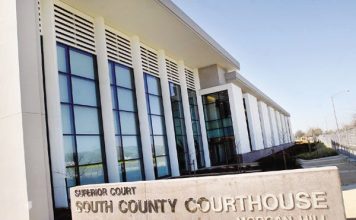Thomas Velladao says fixes are part of ongoing repairs at the
aging park and not a reaction to pressure from state officials
Gilroy – The owner of a ramshackle trailer park in south Gilroy plans major repairs to dilapidated roads and a sewer system that spewed 700 square feet of waste in March, though he says the upgrades are not in response to an ultimatum from state housing officials.
Officials with the California Department of Housing and Community Development issued a final compliance order at the beginning of June to Thomas Velladao, giving him 30 days to submit a plan to overhaul the sewer system and perform dozens of other repairs at Velladao Mobile Home Park, tucked out of view at the corner of Luchessa Avenue and Monterey Road.
Officials warned in the letter of the possible suspension of the park’s operating license and referral to county prosecutors if problems go uncorrected.
Velladao, a Marin lawyer and tax accountant, said he has been working with various electricians, plumbers and other contractors to correct the 38 violations cited in May by state officials. But he described those fixes as part of ongoing repairs at the aging park rather than “knee jerk” reactions to state pressure.
“Before the state ever told me a single word, I cut out three or four pieces of pipe that were being crimped by tree roots,” he explained, referring to Eucalyptus trees that have plagued the network of black sewer pipes connecting the mish-mash of 25 trailers to city sewer mains. In addition to those recent fixes, a new plumbing contractor recently identified grease build-up as another source of back-ups in sewer lines.
But Velladao blames the spills on residents, claiming they remove sewage “clean-out” caps from the above-ground pipes when back-ups occur.
He said the long-term solution will involve regularly “blowing out” grease build-up from pipes using pressurized water.
“We will soon, within the next two to three weeks, either put in new sewage pipes or we will provide for a routine review of the lines with water-pressurized blow outs,” Velladao wrote in a letter to the editor. “Whichever the state thinks is the most reasonable solution to the problem.”
Velladao commenced the bidding process for a contractor to repave roads and inspect and replace portions of the sewer system in May, following another sewage outbreak of a smaller scale. He also filled some pot holes, covered exposed electrical outlets in the communal laundry room, and cut back tree branches hanging dangerously close to power lines.
The two dozen families living in the mish-mash of trailers also received orders to clean up animal droppings, remove illegal storage shacks and correct dozens of other violations.
State housing officials reported that residents had complied with 70 percent of the clean-up orders by early May but criticized park management for failing to address the most pressing violations. It remains unclear if Velladao’s latest proposal will pass muster with HCD inspectors who plan to re-inspect the site in early July.
HCD spokeswoman Janet Huston declined to comment Monday on the proposed changes because the agency had not yet received official notification from Velladao.
“We would have to communicate with him first,” Huston said. “It’s something the inspectors would have to look at and evaluate. I don’t think we could give an off-the-cuff answer. It wouldn’t be fair to the owner.”
Huston and other HCD officials have emphasized that the agency avoids ordering excessive repairs or shutting down parks for fear of forcing low-income tenants from their homes. The half-dozen closures in Northern California in recent years involved the most persistent and egregious cases of health and safety violations.
Velladao, who inherited the park from his family, said he is no “slum lord.”
“In a word, I have been a conscientious landlord for over 10 years and the decisions that I have made concerning the park have always taken into account the impact on the lives of the tenants,” Velladao wrote. “To say that I don’t care about the living conditions of the tenants is patently false.”
Yet he admitted that relations between some tenants and park management have deteriorated in recent years. The problems, he said, emerged after a confrontation with a handful of residents over the removal of illegal storage shacks and other structures cited as safety violations by the state. Ultimately, HCD holds park owners responsible for the costs of removing such structures.
Velladao added that a number of residents have lived at the park for years without complaint.
“That’s fine for those who didn’t have to live and sleep under the smell,” said Martha Ybarra, one of several residents who complained to the Dispatch in March about a week-old sewage spill by their trailers. Ybarra – who after four years living in the park, moved at the end of May – remained skeptical that long-term repairs would take place. She also questioned the order of priorities.
“I believe there are things that should be more important than trimming branches and fixing the laundry outlets,” she said. “There are roads, lights and the sewers are just plain old. They can keep on fixing the little things, but the big problems have to be taken care of.”
Dispatch employee Mary Gamboa translated the comments of Martha Ybarra.














